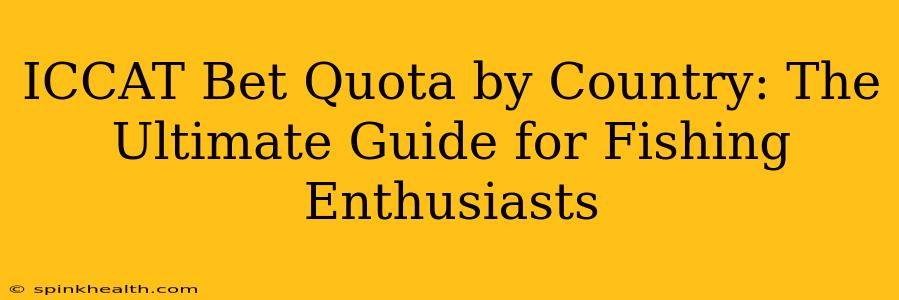The International Commission for the Conservation of Atlantic Tunas (ICCAT) plays a crucial role in managing the sustainable fishing of tuna and tuna-like species in the Atlantic Ocean and adjacent seas. Understanding ICCAT's tuna quotas by country is vital for anyone interested in the conservation of these magnificent creatures and the future of the fishing industry. This guide delves into the complexities of ICCAT's quota system, providing a comprehensive overview for fishing enthusiasts and anyone concerned about responsible fisheries management.
What is ICCAT and Why are Quotas Important?
ICCAT is an intergovernmental organization responsible for the conservation and management of tuna and tuna-like species in the Atlantic Ocean and its adjacent seas. Its members include coastal states, as well as fishing nations with significant interests in the Atlantic tuna fisheries. The organization's primary goal is to ensure the long-term sustainability of these valuable fish stocks. This is achieved through various measures, with catch quotas being a cornerstone of their management strategy. Quotas limit the total allowable catch (TAC) for each species by country, aiming to prevent overfishing and allow stocks to replenish. Without effective quota management, these valuable resources risk depletion, impacting both the environment and the livelihoods of those dependent on the fishing industry.
How are ICCAT Tuna Quotas Determined?
Determining ICCAT tuna quotas is a complex process involving scientific assessments, negotiations, and political considerations. Scientists analyze stock assessments, considering factors like population size, growth rates, and fishing mortality. Based on this scientific advice, ICCAT's member countries negotiate the total allowable catch (TAC) for each species. This negotiation process can be challenging, as different countries have varying interests and perspectives. Reaching consensus often requires compromise and careful consideration of the scientific evidence. Once a TAC is agreed upon, it's then allocated to individual countries based on various factors, which may include historical fishing patterns, capacity, and scientific recommendations. The allocation process itself is also subject to negotiations and adjustments.
What are the main tuna species managed by ICCAT?
ICCAT manages a wide variety of tuna and tuna-like species, including but not limited to:
- Atlantic bluefin tuna: This highly sought-after species is subject to strict quota management due to its previous overfishing.
- Bigeye tuna: Another commercially important species, subject to similar management strategies.
- Yellowfin tuna: A widely distributed species with a significant commercial value.
- Albacore tuna: Frequently caught by recreational and commercial fishers.
- Swordfish: Though not a tuna, this species is also managed under the ICCAT framework.
The specific quotas for each species vary considerably from year to year depending on stock assessments and negotiations.
Where Can I Find the Latest ICCAT Quota Information?
The most reliable source for up-to-date ICCAT quota information is the official ICCAT website. Their website contains detailed reports, resolutions, and statistical data on catches and quotas by country and species. While accessing this data may require some navigation, the information available is comprehensive and official. You can find species-specific and country-specific data, providing a transparent overview of the regulatory framework. Note that the information is frequently updated, so it’s beneficial to check regularly for the latest figures.
How often are ICCAT quotas updated?
ICCAT quotas are typically reviewed and updated annually, coinciding with the organization's annual meetings. These meetings bring together member countries to review the latest scientific assessments, discuss management options, and agree on the quotas for the upcoming year.
Are there any discrepancies in the reported catch vs. the allocated quota?
Monitoring compliance with ICCAT quotas is a continuous challenge. There are instances of illegal, unreported, and unregulated (IUU) fishing activities that affect the accuracy of reported catches. ICCAT actively works to combat IUU fishing through observer programs, port state measures, and collaboration with other international organizations. However, achieving perfect compliance remains an ongoing effort. Independent organizations and researchers also conduct analyses to monitor the discrepancies between reported catches and allocated quotas, contributing to the overall assessment of the effectiveness of the management measures.
The Future of ICCAT and Sustainable Tuna Fishing
ICCAT's role in managing Atlantic tuna stocks is critical for the long-term sustainability of these valuable resources. Continuous improvements in scientific assessments, enhanced monitoring and control measures, and increased international cooperation are essential for ensuring the effectiveness of the quota system and the conservation of these species for future generations. The commitment of ICCAT's member states to responsible fisheries management is crucial for maintaining healthy tuna populations and supporting the livelihoods that depend on them. The transparent sharing of data and the commitment to scientific rigor are vital steps towards achieving truly sustainable fishing practices in the Atlantic Ocean.

